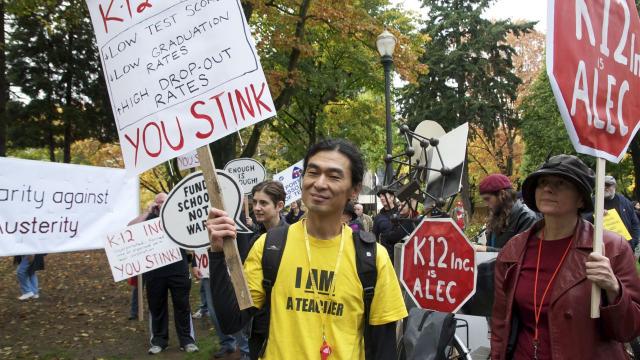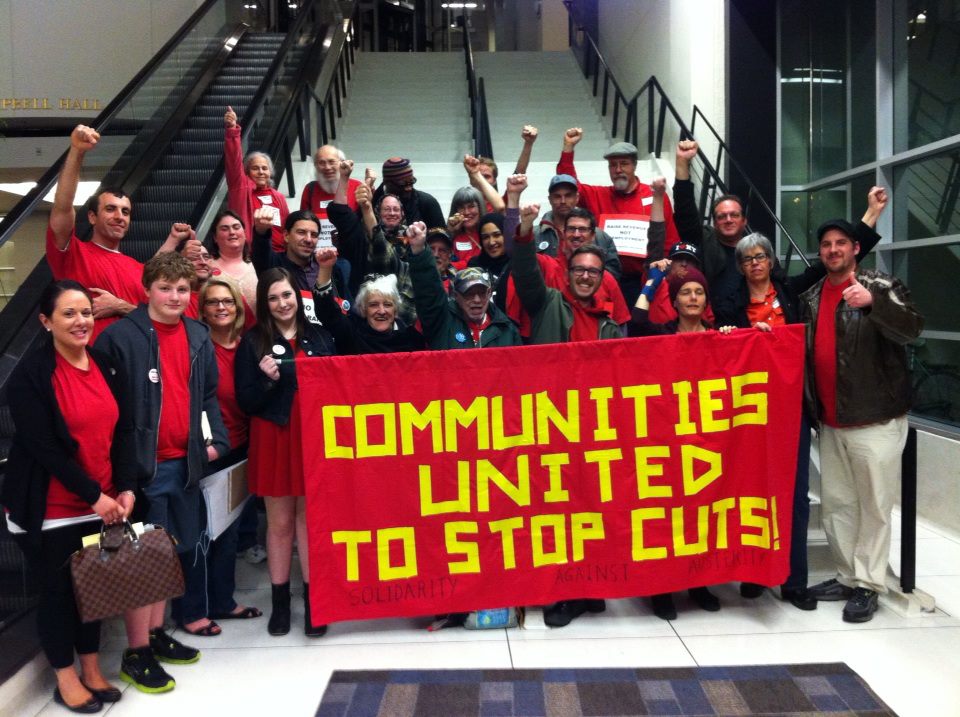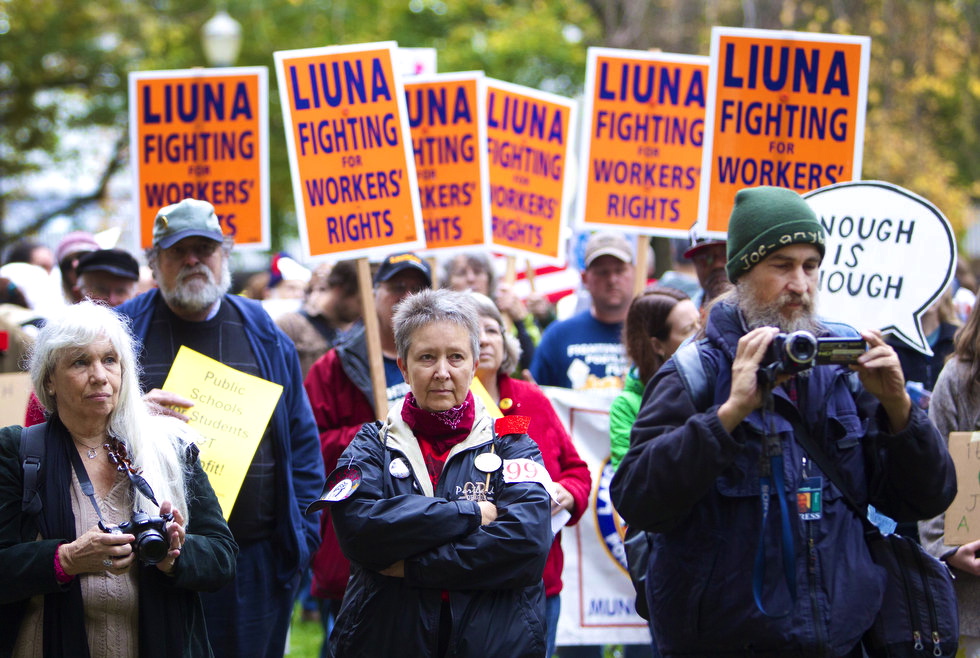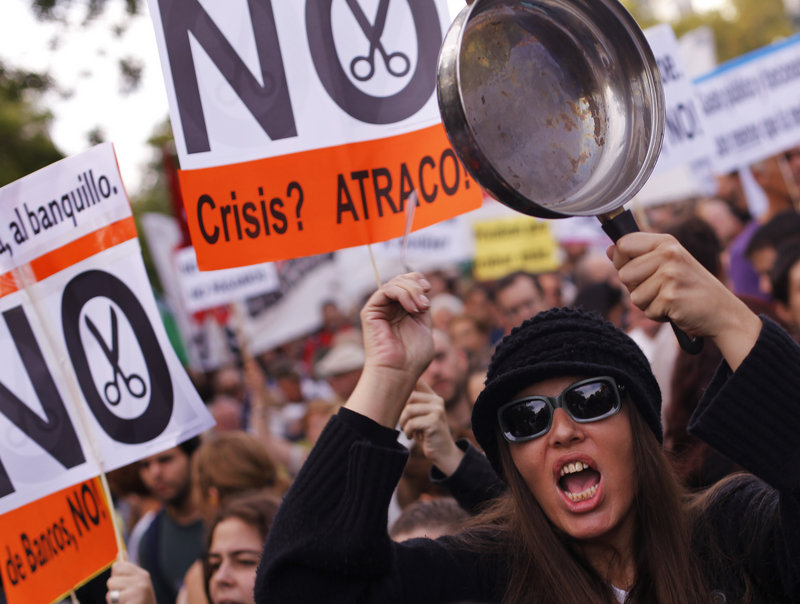
Along a stretch of sidewalk in front of Portland's City Hall, some 50 people stood braving the rain in the hours before the city's final public budget hearing last week. Among the group were activists in orange jumpsuits holding a large banner that read, "Hunger for Justice, Close Guantanamo."
The focus of last week's protest was the cuts to a broad swath of social programs and services the City Council and recently elected Mayor Charlie Hales plan to execute. While not as densely packed as the last austerity protest on April 11, demonstrators this time came with a clear metaphor — “Time to bake a bigger pie” — as they urged the city to raise revenues and avoid devastating budget cuts.
Charles Johnson, 43, stood clad in an orange jumpsuit with a long grey beard and glasses, and the word “Gitmo” upon his back. He wore it in solidarity with a nationwide demonstration by activists who are on hunger strike to protest the injustices of Guantanamo — but he was also protesting the city's proposed cuts.
“I’m here to remind city officials that we elected them to find ways to continue the services,” he explained, “which means looking at revenue, not just cutting services.” Like many demonstrating there, Johnson was well spoken and knowledgeable about the city's current budget fiasco. An East Coast transplant who has been in Portland for under a year, he said he is more concerned about how the cuts will affect others rather than himself.
“Everybody who has got a fairly comfortable situation has a moral obligation to speak up for the people who are most at risk,” he said. But “a few of the cuts even make sense. We live in an over-policed society, so to trim from the police makes sense. But to trim from services that provide health care and prevent sexual diseases makes no sense at all.”
Among the people airing their grievances at City Hall last week, you didn't have to look far to find some of them who are directly affected by the cuts Johnson seemed to support. “The general consensus among city employees is that we all want to provide good services,” said Mary Prottsman, a 32-year-old member of the Port Staff division of Portland's Police Department.
“The frustration comes in when you have so few people responsible for so much work. I’ve already been laid off twice from the city,” she said, and indicated that people's workloads have grown, not only in the police field but across the public sector, in an increasingly understaffed city. “The Portland police records division is month behind getting reports in, and accessible, in our data bases. The Bureau of Development Services, they’ve had so many budget cuts in the last few years that the employees certified to do the work can’t meet [the responsibilities] in a timely manner.”
Also out protesting last week was Jose Serrica, who was about to turn 57 and did not have a home. “I became homeless by choice. I’m a pastor,” he said with a smile. "My passion is working with homeless people, so I thought it made best sense to become a homeless person.”
Serrica appeared well known and respected among the other homeless people who were there at City Hall to demonstrate while also collecting donated meals, baked pies and other offerings. As a pro-bono social worker and homeless activist, he expressed blunt views of the city's budgetary crisis and who is most responsible for it.
“We have a mayor here that used to be the vice president of a major corporation and that is now privatizing our water system,” Serrica declared. “Corporations are starting to privatize everything. Now the Portland business alliance wants to pretty much criminalize homelessness.”
Meanwhile, inside the City Hall chambers, crowds of witnesses vied for the limited future funds available to social projects. News came early about the redistribution of money to allow the city’s needle exchange program to continue to operate, as well as the retraction of a cut that would have closed all of Portland's SUN Community Schools.
“The proposed budget cuts would cut $631,000 from the wrap-around services” for rehabilitation of commercially and sexually exploited youths, said Sarah Nedeau, the lead program coordinator of Athena House — part of the city's Janus Youth Programs, which provide critical help to young people and are severely threatened in the current budget talks.
“Youth will not succeed without the wrap-around mental health and advocacy services," Nedeau said.
Portland will have two community budget forums, on May 18 and May 23, before the City Council votes to approve the new budget on May 29.
3 WAYS TO SHOW YOUR SUPPORT
- Log in to post comments

















